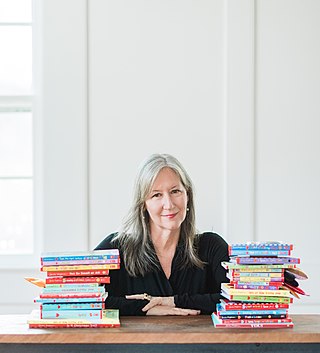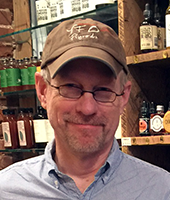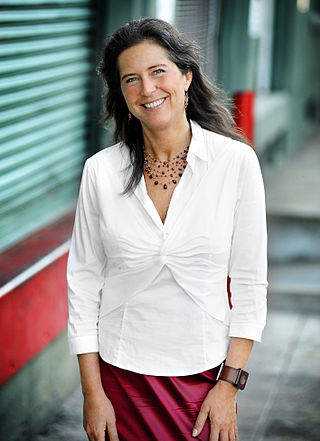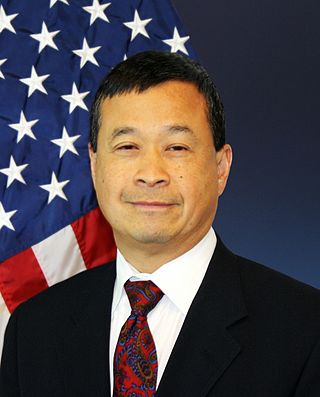Music psychology, or the psychology of music, may be regarded as a branch of both psychology and musicology. It aims to explain and understand musical behaviour and experience, including the processes through which music is perceived, created, responded to, and incorporated into everyday life. Modern music psychology is primarily empirical; its knowledge tends to advance on the basis of interpretations of data collected by systematic observation of and interaction with human participants. Music psychology is a field of research with practical relevance for many areas, including music performance, composition, education, criticism, and therapy, as well as investigations of human attitude, skill, performance, intelligence, creativity, and social behavior.
Helen S. Mayberg, is an American neurologist. Mayberg is known in particular for her work delineating abnormal brain function in patients with major depression using functional neuroimaging. This work led to the first pilot study of deep brain stimulation (DBS), a reversible method of selective modulation of a specific brain circuit, for patients with treatment-resistant depression. As of August 2019, she has published 211 original peer-reviewed articles, 31 books and book chapters, and acted as principal investigator on 24 research grants. Mayberg is coinventor with Andres Lozano of “Method for Treating Depression Mood Disorders and Anxiety Disorders using Neuromodulation,” US patent 2005/0033379A1. St. Jude Medical Neuromodulation licensed her intellectual property to develop Subcallosal Cingulate Deep Brain Stimulation for Treatment-Resistant Unipolar and Bipolar Depression for the treatment of severe depression. As of 2018, Mayberg holds positions as Professor of Neurology and Neurosurgery and Professor, Psychiatry and Neuroscience, both at Mount Sinai Medical School, and Professor of Psychiatry, Emory University; Emory University Hospital. Since 2018, she has served as Director, Nash Family Center for Advanced Circuit Therapeutics at the Icahn School of Medicine at Mount Sinai.

Lisa Feldman Barrett is a University Distinguished Professor of psychology at Northeastern University, where she focuses on affective science. She is a director of the Interdisciplinary Affective Science Laboratory. Along with James Russell, she is the founding editor-in-chief of the journal Emotion Review. Along with James Gross, she founded the Society for Affective Science.

Sandra Magsamen is an American author, artist, art therapist, and designer. She has published over 60 children's books with publishers Scholastic, Sourcebooks and Little Brown and has worked with national department stores, mid-tier, specialty and mass market through her national lifestyle brands From the Studio of Sandra Magsamen, Messages from the Heart, Wishes & Kisses and Treasured to design custom collections. Magsamen has proudly partnered with retailers such as Walmart, JCPenney, Hallmark, Studio-e-fabrics, Bamboozle Homewares and 1-800-Flowers.

Eva Lucille Feldman is an American physician-scientist who is a leading authority on neurodegenerative disease. She serves as the Russell N. DeJong Professor of Neurology at the University of Michigan, as well as Director of the NeuroNetwork for Emerging Therapies and ALS Center of Excellence at Michigan Medicine. She was also named the James W. Albers Distinguished University Professor of Neurology.
Richard Lewis Huganir is a Bloomberg Distinguished Professor in the Departments of Neuroscience and Psychological and Brain Sciences, Director of the Solomon H. Snyder Department of Neuroscience, and co-director of the Johns Hopkins Medicine Brain Science Institute at the Johns Hopkins University School of Medicine. He has joint appointments in the Department of Biological Chemistry and the Department of Pharmacology and Molecular Sciences in the Johns Hopkins School of Medicine.
Diane Edmund Griffin is the university distinguished professor and a professor in the Department of Molecular Microbiology and Immunology at the Johns Hopkins Bloomberg School of Public Health, where she was the department chair from 1994-2015. She is also the current vice-president of the National Academy of Sciences. She holds joint appointments in the departments of Neurology and Medicine. In 2004, Griffin was elected to the United States National Academy of Sciences (NAS) in the discipline of microbial biology.

Mark P. MattsonPh.D., is an adjunct professor of neuroscience at the Johns Hopkins School of Medicine.

Charles Edward "Ed" Connor Jr. is an American neuroscientist who has made important contributions to the neuroscience of object synthesis in higher-level visual cortex. From 2009 he has been a Professor of Neuroscience at Johns Hopkins University. In 2007 Connor was appointed Director of the Zanvyl Krieger Mind Brain Institute at Johns Hopkins. Connor has interests in neuroaesthetics, the relation between neuroscience and beauty.

Ivy Ross is an American business executive, jewelry designer, and, since July 2016, vice president of hardware design at Google. She has worked at Google since May 2014; prior to being appointed VP of hardware design, she led the Google Glass team at Google X. Ross's metal work in jewelry design is in the permanent collections of 12 international museums, including the Smithsonian in Washington D.C. One of few recognized fine artists to successfully cross over into the business world, Ross is also a keynote speaker and a member of several boards, and has been hailed as a “creative visionary” by the art world. In February 2019 she was named one of the 15 Most Powerful Women at Google by Business Insider. In July 2019 she was named #9 on Fast Company's 100 Most Creative People in Business. Ivy is the co-author of the New York Times bestselling book Your Brain on Art: How the Arts Transform Us with Susan Huganir Magsamen. This book shares the science behind humanities birthright - to make and behold art and its power to amplify physical and mental health, learning and build stronger communities.

Geoffrey S. F. Ling is a medical doctor who retired from the United States Army as a colonel and was the CEO of On Demand Pharmaceuticals. He served as the founding director of the Defense Advanced Research Projects Agency (DARPA) Biological Technologies Office from 2014 until 2016. He was considered to be the "US Army's premier subject matter expert on traumatic brain injury (TBI)", and was for years the only neuro-intensive care specialist in the US military.

Bloomberg Distinguished Professorships were established as part of a $350 million investment by Michael Bloomberg, Hopkins class of 1964, to Johns Hopkins University in 2013. Fifty faculty members, ten from Johns Hopkins University and forty recruited from institutions worldwide, will be chosen for these endowed professorships based on their research, teaching, service, and leadership records. In December 2021, it was announced that the program would be doubled in size, with an additional fifty professors bringing the total to one hundred scholars, made possible by a new investment by Michael Bloomberg. With recruitment beginning in 2022, the majority of the new professors will be recruited to work in clusters. These faculty-developed interdisciplinary clusters will recruit Bloomberg Distinguished Professors and junior faculty to Johns Hopkins University with the aim of conducting transformational research in crucial areas.

Susan Lynn Schneider is an American philosopher and artificial intelligence expert. She is the founding director of the Center for the Future Mind at Florida Atlantic University where she also holds the William F. Dietrich Distinguished Professorship. Schneider has also held the Baruch S. Blumberg NASA/Library of Congress Chair in Astrobiology, Exploration, and Scientific Innovation at NASA and the Distinguished Scholar Chair at the Library of Congress.

Emma Yhnell is a British scientist, science communicator and senior lecturer based at Cardiff University. She has previously conducted research on computerised cognitive training and Huntington's disease. An advocate for public engagement and science communication, and a STEM ambassador, Yhnell won the British Science Association's Charles Darwin Award Lecture for Agricultural, Biological and Medical Sciences and the British Neuroscience Association's Public Engagement Award.
Nancy Etcoff is an American psychologist and researcher at Harvard University. Etcoff has maintained a private practice in psychology, and taught classes about the mind, brain, behavior, and aesthetics at Harvard Medical School. Etcoff is best known for her 1999 book Survival of the Prettiest: the Science of Beauty arguing for a biological basis for beauty linked to evolutionary psychology.
Margaret M. "Peg" McCarthy is an American neuroscientist and pharmacologist. She is the James & Carolyn Frenkil Endowed Dean's Professor at the University of Maryland School of Medicine, where she is also Professor and Chair of the Department of Pharmacology. She is known for her research on the neuroscience of sex differences and their underlying mechanisms. In 2019, she received the Gill Transformative Investigator Award from the Gill Center for Biomolecular Science at Indiana University.
Sabina Brennan is an Irish neuroscientist, psychologist, and former television actress. She is currently an adjunct assistant professor working at Trinity College Dublin.
Kathryn Jane Jeffery is a neuroscientist from New Zealand. She is a professor of behavioural neuroscience at University College London. She studies how the brain encodes three-dimensional and complex space, and the role of this representation in spatial cognition and navigation.

Amanda Brown is an American immunologist and microbiologist as well as an associate professor of neurology and neuroscience at Johns Hopkins University School of Medicine in Baltimore, Maryland. Brown is notable for cloning one of the first recombinant HIV viruses and developing a novel method to visualize HIV infected cells using GFP fluorescence.
Una D. McCann is a board certified psychiatrist and researcher at Johns Hopkins School of Medicine in the Department of Psychiatry. She is also the Director of the Anxiety Disorders Program, and Co-Director of the Center for Interdisciplinary Sleep Medicine and Research, and Associate Program Director at the Johns Hopkins Bayview Medical Center. McCann is considered to be an expert in anxiety and stress disorders and her primary areas research revolves around amphetamine-induced monoamine neurotoxicity and neurobiology of anxiety disorders.











